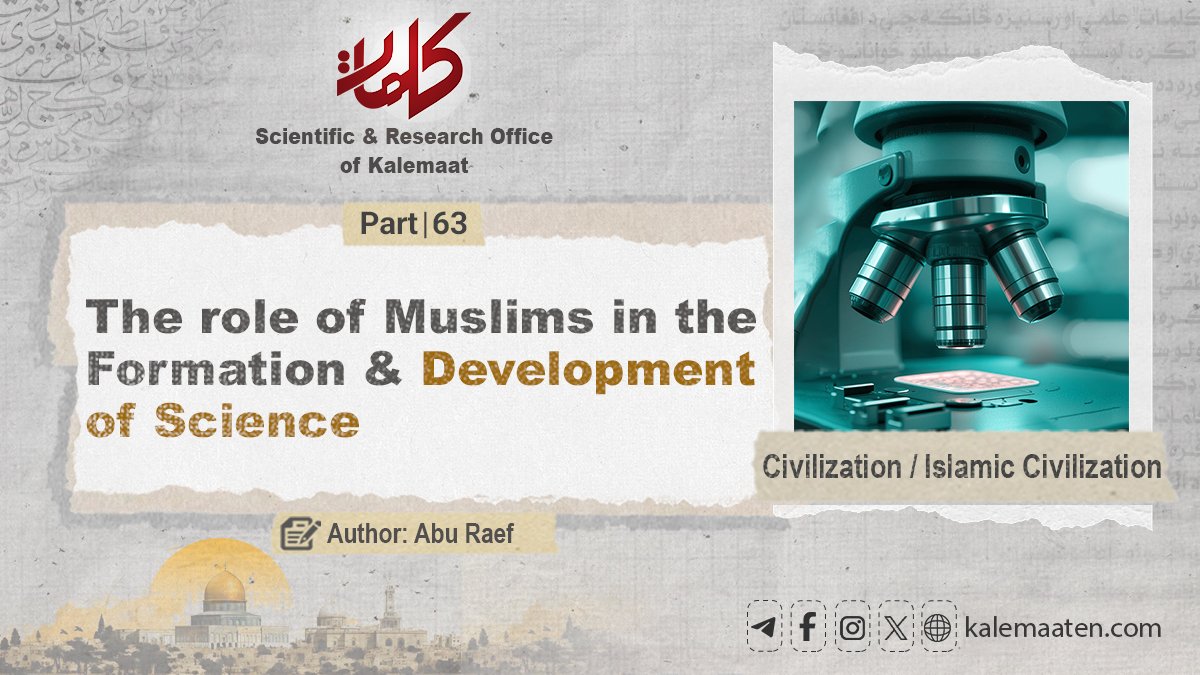Author: Abu Raef
The Role of Muslims in the Formation and Development of Science (Part 63)
Beauty of the Body
The Islamic approach to cleanliness can be summarized in three stages:
1. Prohibition of impurity.
2. Enjoining cleanliness.
3. And recommending adornment, which goes beyond cleanliness.
Muslims knew that neglecting cleanliness is a cause of punishment, because the Prophet (peace and blessings of Allah be upon him) said while passing by two graves: “إنهما لیعذبان وما یعذبان فی کبیر؛ أما أحدهما فکان لا یستتر من البول وأما الآخر فکان یمشی بالنمیمة” Translation: “These two are being punished, but not for a major sin. One of them did not refrain from urinating, and the other was gossiping.” [1]
And when the Prophet (peace and blessings of Allah be upon him) saw a man whose hair and beard were disheveled, he motioned with his hand for him to go out; that is, to tidy up his hair, which the man did, then returned. The Prophet (peace and blessings of Allah be upon him) said: “ألیس هذا خیرا من أن یاتی أحدکم ثائر الرأس کأنه شیطان” Translation: “Isn’t this better than someone coming with disheveled hair, as if he were a devil?” [2]
The Prophet (peace and blessings of Allah be upon him) also recommended cleanliness and tidiness in places where sweating and dirt usually occur, and considered it one of the natural traditions, saying: “خمس من الفطرة: الختان، والاستحداد وتقلیم الأظفار ونتف الإبط، وقص الشارب” Translation: “Five things are part of nature: circumcision, removing pubic hair, cutting nails, plucking armpit hair, and trimming the moustache.” [3]
The Prophet (peace and blessings of Allah be upon him) attached such importance to dental hygiene that he said: “لولا أن أشق علی أمتی لأمرتهم بالسواک عند کل وضوء” Translation: “If it were not difficult for my Ummah, I would have ordered them to use a Miswak (toothbrush) during every Wudu.” [4]
And Hazrat Abdullah ibn Abbas (may Allah be pleased with him) said: “We were commanded to use the toothbrush until we thought that verses would be revealed about it.”
So, it is not surprising that baths spread throughout the Islamic lands and became a distinctive part of the architecture of these countries.
The German orientalist Sigrid Honecke compared the civilizations of Muslims and Europe at that time and wrote: “The Andalusian jurist Al-Tartushi encountered things that made one tremble during his journey to the Frankish lands. He, a Muslim for whom daily ablution and bathing were obligatory, said: “I have never seen people so dirty; they do not wash themselves except once or twice a year, and that with cold water, and they do not wash their clothes until they are rotten and torn.”
He adds: This is incomprehensible to a well-groomed Arab, for whom cleanliness was not only a religious duty; but also a necessity in a hot climate, and then writes: In 10th-century Baghdad, there were thousands of hot public baths with servants and barbers. [5]
Although the hot climate drives people to cleanliness; the lack of rivers and water sources in many areas could be a reason for taking cleanliness lightly, while Europe, despite its abundance of water and rivers, had a culture that was the opposite and even considered dirtiness a kind of honor. Then Islam went beyond cleanliness, “adornment”
The Prophet (peace and blessings of Allah be upon him) said: “حبب إلی من دنیاکم النساء والطیب و جعلت قرة عینی فی الصلوة» Translation: “From your world, women and perfumes became dear to me, and the brightness of my eyes was placed in prayer.” [6] And whenever they brought him a perfume, he would not reject it; rather, he said: من عرض علیه ریحان فلا یرده، فإنه خفیف المحمل طیب الریح” Translation: “Whoever is given a pleasant scent should not reject it, for it is light and fragrant”. [7]
And when a black robe was sewn for the Prophet (peace and blessings of Allah be upon him) and he wore it, he took it off after sweating in it and smelling the smell of wool. [8]
And the servant of the Prophet (peace and blessings of Allah be upon him), Hazrat Anas bin Malik (may Allah be pleased with him), said in describing him: “I have never touched a silk or a cloth softer than the Prophet’s palm, and I have never smelled a smell more pleasant than the Prophet’s scent.” [9]
And thus, cleanliness was a religious duty for Muslims, by performing which they would achieve reward, and in which they saw themselves following their Prophet. [10]
Continues…
Previous Part/ Next Part
References:
1. Bukhari: 213.
2. Muwatta: 1702.
3. Bukhari: 5550.
4. Bukhari: 847.
5. The Sun of the Arabs Shines on the West, p. 54.
6. Nesa’i: 3940.
7. Muslim: 2253.
8. Sunan Abu Dawud: 4074.
9. Muslim: 2330.
10. What Did Muslims Contribute to the World? P. 642.



